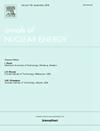Plate-fin heat exchanger optimal design for industry using both single and multi-objective granularity based surrogate assisted Kho-Kho optimization
IF 2.3
3区 工程技术
Q1 NUCLEAR SCIENCE & TECHNOLOGY
引用次数: 0
Abstract
All engineering devices stand on the basis of design. The mechanical design of Plate-fin heat exchanger (PFHE) always needs a better design to reduce cost while increasing productivity. For an optimal design of PFHE, three distinct issues: total heat transfer area, total volume, and total annual cost, are tackled using a novel meta-heuristic approach. This method is termed as the Granularity-based Surrogate-assisted Kho-Kho (GBSA-KKO) approach. The population is granulated into two subsets, i.e., fine grained and coarse grained and then different approximation methods are implemented with new infill criteria. Eight different benchmark functions are carried out to estimate the efficiency of the proposed GBSA-KKO approach. In conclusion, the proposed optimization approaches successfully minimize the objectives of total heat transfer area, total volume, and total annual cost, yielding values of 79.35 m, 0.00247 m, and 838.218$, respectively.
基于单目标和多目标粒度的代理辅助Kho-Kho优化的工业板翅式换热器优化设计
一切工程装置都是建立在设计的基础上的。板式翅片换热器的机械设计一直需要优化设计,以降低成本,提高生产效率。对于PFHE的优化设计,三个不同的问题:总传热面积、总容积和总年成本,采用一种新颖的元启发式方法来解决。这种方法被称为基于粒度的代理辅助kho (GBSA-KKO)方法。将种群划分为细粒度和粗粒度两个子集,然后采用新的填充准则实现不同的逼近方法。采用8个不同的基准函数来评估所提出的GBSA-KKO方法的效率。综上所述,所提出的优化方法成功地使总传热面积、总容积和年总成本、产出率分别达到79.35 m2、0.00247 m3和838.218美元的最小目标。
本文章由计算机程序翻译,如有差异,请以英文原文为准。
求助全文
约1分钟内获得全文
求助全文
来源期刊

Annals of Nuclear Energy
工程技术-核科学技术
CiteScore
4.30
自引率
21.10%
发文量
632
审稿时长
7.3 months
期刊介绍:
Annals of Nuclear Energy provides an international medium for the communication of original research, ideas and developments in all areas of the field of nuclear energy science and technology. Its scope embraces nuclear fuel reserves, fuel cycles and cost, materials, processing, system and component technology (fission only), design and optimization, direct conversion of nuclear energy sources, environmental control, reactor physics, heat transfer and fluid dynamics, structural analysis, fuel management, future developments, nuclear fuel and safety, nuclear aerosol, neutron physics, computer technology (both software and hardware), risk assessment, radioactive waste disposal and reactor thermal hydraulics. Papers submitted to Annals need to demonstrate a clear link to nuclear power generation/nuclear engineering. Papers which deal with pure nuclear physics, pure health physics, imaging, or attenuation and shielding properties of concretes and various geological materials are not within the scope of the journal. Also, papers that deal with policy or economics are not within the scope of the journal.
 求助内容:
求助内容: 应助结果提醒方式:
应助结果提醒方式:


